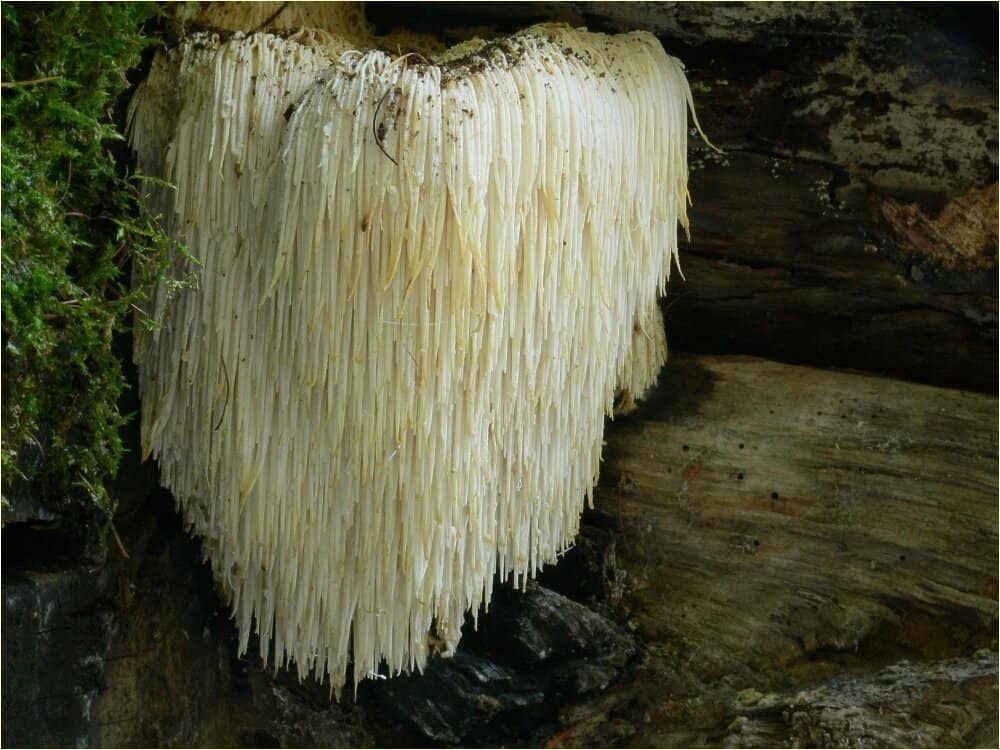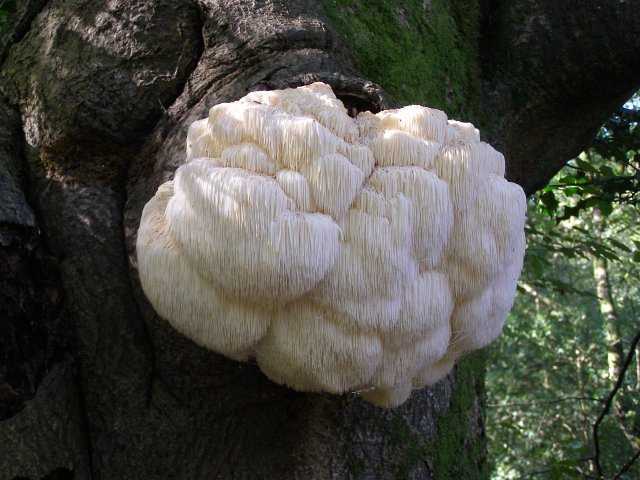Contents
- Maitake
- Chaga Mushroom
- Poria Cocos
- Cordyceps Sinensis / Cordyceps Militaris
- Reishi / Lingzhi
- Lion’s Mane Mushroom
- Shiitake
- AHCC (Active Hexose Correlated Compound)
- Oyster Mushroom
- King Oyster Mushroom
- Enokitake
1. Maitake Mushroom
Maitake Mushroom (Grifola frondosa), also known as “hen of the woods,” is a type of mushroom that is widely used in traditional medicine in Japan and China. Maitake mushroom extract is derived from the fruiting body of the mushroom and is used as a dietary supplement due to its potential health benefits, such as the immune-boosting properties, antioxidant effects, and potential blood sugar, blood pressure, and weight management benefits make it a promising supplement for overall health.

Maitake mushroom on wooden box
Benefits
Immune-Boosting. Maitake mushroom extract has been found to have immune-boosting properties. It contains beta-glucans, which are complex polysaccharides that stimulate the immune system and help to fight off infections.
Antioxidant Properties. Maitake mushroom extract is also rich in antioxidants, such as flavonoids and phenols. These compounds help to protect cells from oxidative stress and inflammation, which can contribute to the development of chronic diseases like cancer, heart disease, and diabetes.
Blood Sugar Control. Some research suggests that maitake mushroom extract may help to regulate blood sugar levels. A study published in the Journal of Pharmacy and Pharmacology found that maitake mushroom extract reduced blood glucose levels in rats with diabetes.
Blood Pressure Control. Maitake mushroom extract may also have blood pressure-lowering effects. A study published in the Journal of Medicinal Food found that maitake mushroom extract reduced blood pressure in rats with hypertension.
Weight Management. Maitake mushroom extract may also have potential weight management benefits. A study published in the Journal of Medicinal Food found that maitake mushroom extract reduced body weight and body fat in mice fed a high-fat diet.
Side-effects
While some studies have found that maitake mushroom extract may have health benefits, the research is limited, and more studies are needed to confirm these findings.
Maitake mushroom extract is generally considered safe when taken in recommended doses. However, some people may experience side effects such as stomach upset, diarrhea, and allergic reactions.Maitake mushroom extract may interact with some medications, such as blood thinners, and should be avoided by people taking these medications.
Like many dietary supplements, maitake mushroom extract supplements may be contaminated with harmful substances, such as heavy metals or pesticides. It is important to choose a reputable brand and purchase from a trusted source.
2. Chaga Mushroom
Chaga Mushroom (Inonotus obliquus) is a popular natural supplement that has been used for centuries in traditional medicine for its potential health benefits. Extracted from the chaga, which grows on birch trees in cold regions such as Russia, Northern Europe, and Asia, this supplement is rich in antioxidants and other compounds that have been linked to various health benefits.
The potential health benefits includes immune system support, antioxidant activity, anti-inflammatory effects, blood sugar control, and improved cognitive function.
Benefits
Immune system support. The mushroom has been found to stimulate the immune system by increasing the production of immune cells, including lymphocytes and natural killer cells. These cells play a critical role in defending the body against viruses and other pathogens.
Antioxidant activity. Chaga mushroom is rich in antioxidants, including betulinic acid, ergothioneine, and polysaccharides. These compounds help to neutralize free radicals, which can cause oxidative stress and damage to cells.
Anti-inflammatory effects. Chaga has been found to have anti-inflammatory effects, which can help to reduce inflammation in the body. This is important as chronic inflammation is linked to many chronic diseases such as heart disease, diabetes, and cancer.
Blood sugar control. The extract has been found to have blood sugar-lowering effects. This is important as high blood sugar levels can lead to type 2 diabetes and other health problems.
Improved cognitive function. The mushroom has been found to have neuroprotective effects, which can help to protect the brain from damage and improve cognitive function. This is important as we age, as cognitive decline can be a significant problem.
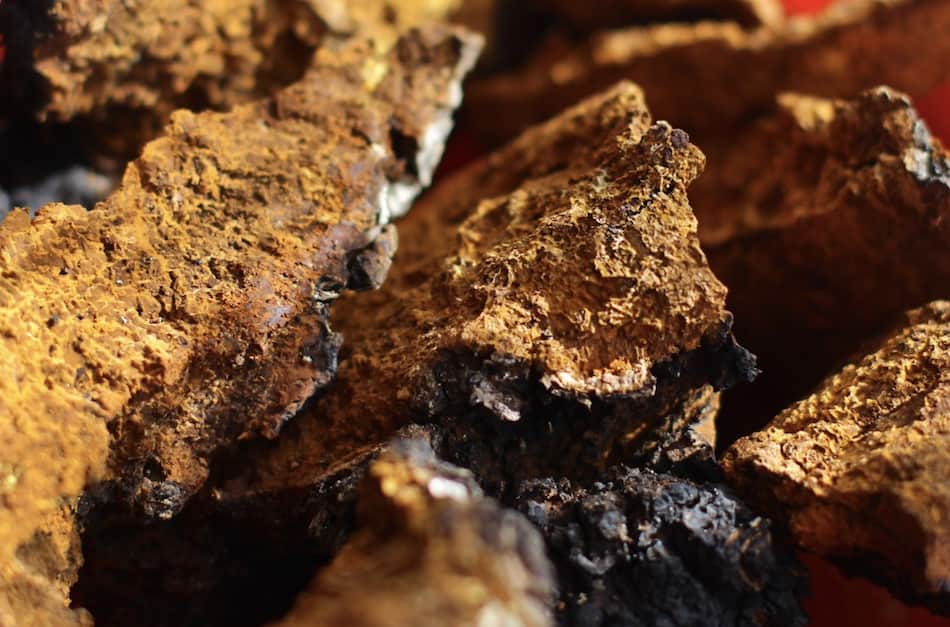
Chaga mushroom pieces (Inonotus obliquus) close up
Side-effects
While Chaga mushroom is generally considered safe, there are some safety concerns. For example, it may interact with certain medications, including blood thinners and insulin. It may also lower blood pressure, which can be problematic for people with low blood pressure.
Chaga mushroom can be expensive, particularly if you opt for a high-quality product. This can be a barrier for some people who are interested in trying it but cannot afford it.
Many of the studies have been done in test tubes or animals, and more research is needed to determine if these effects translate to humans.
3. Poria Cocos Mushroom
Poria Cocos Mushroom (Wolfiporia extensa), also known as Fu Ling, is a traditional Chinese herb that has been used for thousands of years to support health and treat various ailments. The mushroom is grown in Asia and is used in many different forms, including powder, extract, and tea.
Poria appears to have many potential health benefits, including immune system support, anti-inflammatory effects, digestive support, anticancer effects, and improved cognitive function. However, more research is needed to confirm these benefits.
Benefits
Immune system support. Poria has been found to have immune system-boosting effects, including an increase in the production of white blood cells, which are crucial for fighting off infections.
Anti-inflammatory effects. It has been found to have anti-inflammatory effects, which can help to reduce inflammation in the body. Chronic inflammation is linked to many chronic diseases, including heart disease, diabetes, and cancer.
Digestive support. The fungi has been found to have digestive-supporting effects. It can help to regulate bowel movements, reduce bloating, and alleviate digestive discomfort.
Anticancer effects. The mushroom contains polysaccharides and triterpenoids, which have been found to have anticancer effects. Studies have shown that these compounds can help to inhibit the growth of cancer cells and prevent the spread of cancer.
Improved cognitive function. Poria has been found to have neuroprotective effects, which can help to protect the brain from damage and improve cognitive function.

Poria cocos mushroom (Wolfiporia) diced
Side-effects
While the mushroom is generally considered safe, there are some safety concerns. For example, it may interact with certain medications, including blood thinners and medications for high blood pressure.
Poria Cocos can be expensive, particularly if you opt for a high-quality product. This can be a barrier for some people who are interested in trying it but cannot afford it.
While there is some evidence to support the potential health benefits of poria, the research is still limited. Many of the studies have been done in test tubes or animals, and more research is needed to determine if these effects translate to humans.
4. Cordyceps Mushrooms
Cordyceps Mushrooms (C. Sinensis, C. Militaris) are a type of medicinal mushrooms that has been used in traditional Chinese medicine for centuries. It is grown in the high-altitude regions of China, Nepal, and Tibet and is often consumed in the form of a supplement or tea.
Overall, the mushroom appears to have many potential health benefits, including improved exercise performance, anti-aging effects, immune system support, anti-inflammatory effects, and improved respiratory function.

Cordyceps militaris mushrooms on a wooden bowl
Benefits
Improved exercise performance. Cordyceps mushroom has been found to improve exercise performance by increasing oxygen uptake and reducing fatigue. It has also been found to enhance athletic performance and increase endurance in athletes.
Anti-aging effects. Cordyceps contains antioxidants, which can help to protect the body against damage from free radicals. This can help to reduce the signs of aging and promote overall health and longevity.
Immune system support. The fungi has been found to have immune system-boosting effects. It can help to increase the production of white blood cells and enhance the activity of natural killer cells, which are important for fighting off infections.
Anti-inflammatory effects. Cordyceps has been found to have anti-inflammatory effects, which can help to reduce inflammation in the body. Chronic inflammation is linked to many chronic diseases, including heart disease, diabetes, and cancer.
Improved respiratory function. It has been found to have respiratory-supporting effects. It can help to improve lung function and reduce symptoms of respiratory conditions, such as asthma and chronic obstructive pulmonary disease (COPD).
Side-effects
While Cordyceps mushroom is generally considered safe, there are some safety concerns. For example, it may interact with certain medications, including blood thinners and immunosuppressants.
It can be expensive, particularly if you opt for a high-quality product. This can be a barrier for some people who are interested in trying it but cannot afford it.
While there is some evidence to support the potential health benefits of Cordyceps Mushroom, the research is still limited. Many of the studies have been done in animals or test tubes, and more research is needed to determine if these effects translate to humans.
5. Reishi Mushroom
Reishi Mushroom (Ganoderma lucidum) – or Lingzhi as it is known in China – is a type of medicinal mushroom that has been used for over two millennia in traditional Chinese medicine (TCM). It was known as the “mushroom of immortality” during ancient times and recognized it the valuable therapeutics. Lingzhi was reserved solely for the Emperor and prohibited with death sentence for common people.
Reishi appears to have many potential health benefits, including immune system support, anti-inflammatory effects, improved sleep, anticancer effects, and anti-aging effects. Today it is typically consumed in the form of a extracted supplement or as a tea.
Benefits
Immune system support. Reishi mushroom has been found to have immune system-boosting effects. It can help to increase the production of white blood cells and enhance the activity of natural killer cells, which are important for fighting off infections.
Anti-inflammatory effects. The mushroom has been found to have anti-inflammatory effects, which can help to reduce inflammation in the body. Chronic inflammation is linked to many chronic diseases, including heart disease, diabetes, and cancer.
Improved sleep. Reishi has been found to have sleep-promoting effects, and may be helpful for people who have trouble sleeping. It has also been found to improve the quality of sleep, and may help to reduce daytime fatigue.
Anticancer effects. Lingzhi mushroom has been found to have anticancer effects, and may help to prevent the growth and spread of cancer cells. It has also been found to improve the effectiveness of chemotherapy and radiation therapy, and may help to reduce the side effects of these treatments.
Anti-aging effects. It contains antioxidants, which can help to protect the body against damage from free radicals. This can help to reduce the signs of aging and promote overall health and longevity.

Reishi mushrooms growing on a tree
Side-effects
While reishi mushroom is generally considered safe, there are some safety concerns. For example, it may interact with certain medications, including blood thinners and immunosuppressants.
The mushroom can be expensive, particularly if you opt for a high-quality product. This can be a barrier for some people who are interested in trying it but cannot afford it.
While Reishi mushroom is generally considered safe, some people may experience side effects, such as upset stomach, diarrhea, or skin rashes.
While there is some evidence to support the potential health benefits of reishi, the research is still limited. Many of the studies have been done in animals or test tubes, and more research is needed to determine if these effects translate to humans.
6. Lion’s Mane Mushroom
Lion’s Mane Mushroom (Hericium erinaceum), known as Yamabushitake in Japan, has over centuries been used in China and Japan, both a culinary food and as a traditional medicine. It is a large, white, and hairy mushroom, so it is no wonder it got its name from the likeness to a lion’s mane (1).
More recently there has been a renewed interest in the mushroom as new research has emerged that show a range of health benefits from on the brain and body. Particularly fascinating are the nootropic effects of lion’s mane mushroom for improving cognitive performance. One of the findings is that lion’s mane increases the production of enzymes that promote Nerve Growth Factors (NGF) (2).
Nerve Growth Factor is a neuropeptide and a neurotrophic factor that is involved maintaining and in regulating the growth of neurons. The release of NGF not only stimulates memory formation and recall, but it also has a positive effect on mood and in reducing anxiety (3).
Mental functioning decline as we grow old, which may occur as the brain’s ability to form new connections and grow new neurons decline (4). Studies suggest that lion’s mane mushrooms contains at least two compounds that stimulate the growth of new brain cells: erinacines and hericenones (2).
Additionally, animal studies have found that lion’s mane may help protect against Alzheimer’s disease, a degenerative brain disease that causes progressive memory loss. In fact, lion’s mane mushroom extracts have been shown to reduce symptoms of memory loss in mice, as well as prevent neuronal damage caused by amyloid-beta plaques, which accumulate in the brain during Alzheimer’s disease (5), (6), (7).
Igelstachelbart (Hericium erinaceus) by Lebrac / Creative Commons
Benefits
May Modulate the Inflammation Behind Alzheimer’s Disease
More recent studies have examined if lion’s mane mushroom is beneficial for treating Alzheimer’s disease in humans by modulating the inflammation behind the build-up amyloids (8). One study found that a daily supplementation of merely 3 gram lion’s mane mushroom for 16 weeks improved mental functioning significantly in older adults with mild cognitive impairment. Moreover, 4 weeks after the termination of supplementation the scores decreased significantly (9).
Helps Relieve Mild Symptoms of Depression and Anxiety
Several studies have implicated chronic inflammation as a key contributing factor in depression and anxiety. A small double-blind study in Japan investigated the clinical effects of lion’s mane mushroom on depression, menopause, sleep quality on women during 4 weeks and reported significant improvements in the group that were administered supplements with lion’s mane (3).
Other animal research find that supplementation with the substance amycenone found in lion’s mane mushroom can reduce depression and anxiety due to its anti-inflammatory effect (11), (12).
Animal studies have found that lion’s mane extract can regenerate brain cells and improve the functioning of the hippocampus, which in turn affect memory formation and emotional response. The results indicate that chronic administration of lion’s mane mushroom can exert antidepressant and anxiolytic effects possibly from hippocampal neurogenesis (13), (14).
May Speed Recovery from Nervous System Injuries
The nervous system consists of the brain, spinal cord and other nerves that travel throughout the body. These components work together to send and transmit signals that control almost every bodily function. Injuries to the brain or spinal cord can be devastating. They often cause paralysis or loss of mental functions and can take a long time to heal.
Research find that lion’s mane mushroom extract may speed the recovery from brain or spinal cord injuries – that cause paralysis and loss of cognitive functions – by stimulating the growth and repair of nerve cells (15), (16), (17).
May Protect from Stomach Ulcers
Ulcers are capable of forming anywhere along the digestive tract, including the stomach, the small- and large intestine. Ulcers are commonly caused by two factors: damage to the mucous layer of the stomach from the extended use of pain medication, such as non-steroidal anti-inflammatory drugs (NSAIDs), and by the excessive growth of the bacteria H. pylori due to unhealthy eating habits (18).
Lion’s mane extract may protect against the development of stomach ulcers by inhibiting the growth of H. pylori and thus protecting the stomach lining from damage (19), (20).
Decreasing Heart Disease Risk Factors
High triglycerides, cholesterol, and obesity are all central risk factors in heart disease and studies show that lion’s mane extract has a beneficial effect on each of them.
An in vitro study finds that lion’s mane improves fat metabolism and lowers triglyceride levels (21). Research also show that lion’s mane extract may prevent the oxidation of cholesterol in the bloodstream (22). The problem with oxidized cholesterol molecules is that they tend to attach to the walls of arteries, which results in hardened walls and an increased risk for heart attack and stroke. Lion’s mane mushroom also contains hericenone B which has been found to decrease blood clotting and thus lowering the risk of heart attacks and stroke (23).
May Decrease the Risk for Diabetes
Diabetes occurs when the body loses the ability to control blood sugar levels. This results in the blood sugar levels being consistently and chronically elevated, which eventually results in kidney disease, vision loss, and nerve damage to the hands and feet.
Lion’s mane mushroom can be useful in managing diabetes by improving blood sugar control. Animal studies report that lion’s mane mushroom can reduce blood sugar levels significantly in normal and diabetic mice even at very low doses (6 mg/kg) (24), (25). Lion’s mane reduces the levels by inhibiting the activation of the alpha-glucosidase enzyme, which is breaking down carbohydrates in the small intestine (26). When the alpha-glucosidase enzyme is blocked the intestine cannot digest and absorb carbohydrates as efficiently, which naturally lowers blood sugar levels.
May Decrease the Risk for Certain Cancer Types
Cancer means that the DNA has become damaged, which results in cells beginning to divide and replicate at an accelerated rate. Lion’s mane contains distinct substances that may help fight cancer (27), (28). Test-tube studies have found that human cancer cells mixed with lion’s mane extract results in the cancer cells dying at a faster rate, including liver, stomach, blood, and colon cancer cells (29), (30), (31).
Yet another study of mice with colon cancer reported that lion’s mane extracts reduced the spread of the cancer to the lungs by 69% (32). Studies of mice have also showed that lion’s mane extracts have been more effective than regular cancer medications in slowing tumor growth, while also having fewer side-effects (30).
Hericium erinaceum on an old tree in Shave Wood, New Forest, U.K. by Jim Champion / Creative Commons
Side-effects
Not enough is known about the use of Hericium erinaceus in medicinal amounts during pregnancy and breastfeeding. Stay on the safe side and avoid using the supplement during pregnancy and while breastfeeding.
May slow blood clotting. This might increase the chances bleeding in people with bleeding conditions.
May lower blood sugar. Watch for signs of low blood sugar (hypoglycemia) and monitor your blood sugar carefully if you have diabetes.
7. Shiitake Mushroom
Shiitake Mushroom (Lentinula edodes) has been consumed for centuries in traditional Chinese medicine for their medicinal properties. In recent years, shiitake mushroom supplements have gained popularity in the health and wellness industry. The mushroom offers several health benefits, including immune system support, antioxidant properties, cardiovascular health, anti-inflammatory effects, weight management, anticancer properties, and digestive health.
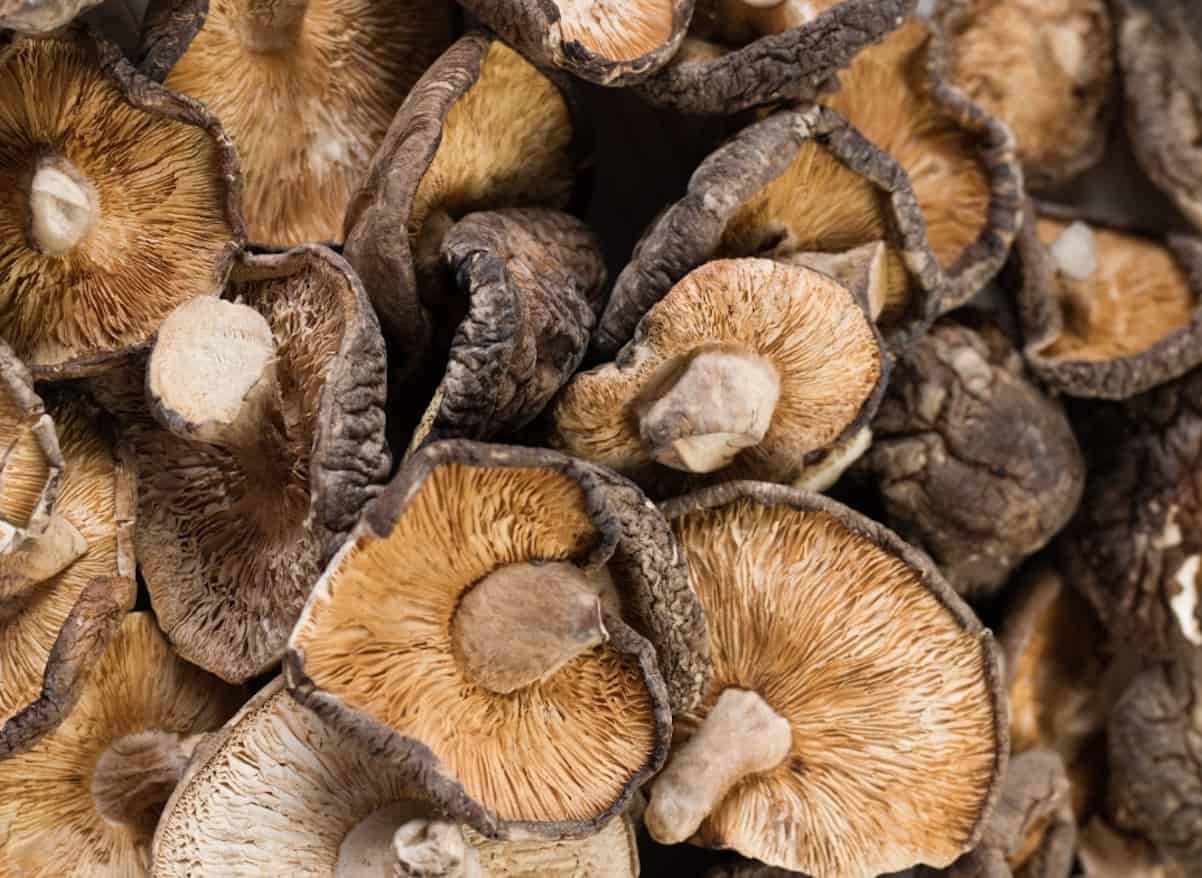
Shiitake mushrooms
Benefits
Immune system support. Shiitake mushrooms are rich in beta-glucans, which are known to support the immune system by stimulating the production of white blood cells.
Antioxidant. The fungi contain ergothioneine and selenium, which are potent antioxidants that help protect cells from damage caused by free radicals.
Cardiovascular health. Shiitake mushrooms contain compounds like eritadenine, sterols, and beta-glucans, which are known to help lower cholesterol levels and improve cardiovascular health.
Anti-inflammatory. Shiitake contain compounds like ergothioneine and beta-glucans, which have been shown to have anti-inflammatory effects.
Weight management. It contain a polysaccharide called lentinan, which has been shown to help with weight management by reducing the absorption of fat and regulating blood sugar levels.
Anticancer. The mushrooms contain compounds like lentinan, eritadenine, and beta-glucans, which have been shown to have anticancer properties.
Digestion. Shiitake mushrooms are rich in dietary fiber, which can help improve digestive health by promoting the growth of healthy gut bacteria.
Side-effects
Some individuals may be allergic to shiitake mushrooms, and consuming shiitake mushroom supplements can cause allergic reactions such as skin rashes, itching, and breathing difficulties.
Shiitake can interact with blood-thinning medications and increase the risk of bleeding.
Some individuals may experience digestive issues like bloating, gas, and diarrhea when consuming shiitake mushroom supplements in high doses.
The mushrooms are a natural source of vitamin D, but the amount of vitamin D present in shiitake mushroom supplements can vary. Individuals who rely on shiitake mushroom supplements as a source of vitamin D should be aware of the variability in vitamin D content.
Shiitake that are grown in contaminated soil can contain heavy metals like lead and cadmium, which can be harmful to human health. It is essential to choose mushrooms from reputable sources that conduct regular heavy metal testing. An internationally certified organic and responsible producer would pass the test, as they test both raw material batches and the finished extracts.
8. AHCC (Active Hexose Correlated Compound
Active Hexose Correlated Compound (AHCC) is a natural supplement derived from the mycelia of shiitake mushrooms. It has been used in traditional Japanese medicine for its immune-boosting properties and is now gaining popularity in Western medicine. In this article, we will discuss the benefits and drawbacks of using AHCC.
Benefits
Immune system. AHCC has been shown to enhance the immune system by increasing the activity of natural killer (NK) cells, T-cells, and macrophages. These immune cells play a crucial role in defending the body against foreign invaders such as viruses and cancer cells. AHCC also helps to boost the production of cytokines, which are signaling molecules that coordinate the immune response.
Anticancer. AHCC has been studied for its potential anticancer properties. In a laboratory study, AHCC was found to inhibit the growth of human prostate cancer cells. It has also been shown to enhance the effectiveness of chemotherapy in cancer patients. In a study of patients with liver cancer, those who took AHCC had a higher rate of survival than those who did not.
Liver health. AHCC has been shown to have protective effects on the liver. In a study of patients with chronic hepatitis C, those who took AHCC had a significant improvement in liver function tests. AHCC has also been studied for its potential to prevent liver damage caused by alcohol and other toxins.
Digestion. AHCC has been shown to improve digestive health by reducing inflammation in the gut. In a study of patients with ulcerative colitis, those who took AHCC had a significant reduction in symptoms compared to those who did not.
Stress-relief. AHCC has been studied for its potential to reduce stress and anxiety. In a study of healthy adults, those who took AHCC had a reduction in stress markers compared to those who did not.
Side-effects
AHCC is generally considered safe, but some people may experience side effects such as nausea, diarrhea, and fatigue. These side effects are usually mild and go away on their own.
It may interact with certain medications, such as those used to treat cancer and autoimmune diseases. It is important to talk to your doctor before taking AHCC if you are taking any medications.
As it is derived from shiitake mushrooms, and some people may be allergic to it. If you have a mushroom allergy, you should avoid taking AHCC.
The product can be expensive, especially if you are taking it on a regular basis. It is important to weigh the potential benefits against the cost.
While there is some evidence to support the benefits of AHCC, the research is still limited. Most studies have been small and conducted on animals or in vitro. More research is needed to confirm the effectiveness of AHCC in humans.
9. Oyster Mushroom
Oyster mushrooms (Pleurotus ostreatus) are a type of edible mushroom that have been used for centuries in traditional medicine for their potential health benefits. They are now also available in supplement form, which has led to increased interest in their effects on human health. This article will discuss the potential benefits and drawbacks of using oyster mushroom supplements.
In summary, oyster mushroom supplements may offer several potential health benefits, including immune system support, antioxidant properties, blood sugar control, anti-inflammatory effects, and cardiovascular health. However, they may also have some drawbacks, such as adverse effects, limited regulation, and limited research. It is important to consult with a healthcare provider before using oyster mushroom supplements and to prioritize a healthy diet and lifestyle as the foundation of good health.
Benefits
Immune system.Oyster mushrooms contain beta-glucans, which are complex polysaccharides that can stimulate the immune system. Some studies have suggested that consuming oyster mushrooms or taking oyster mushroom supplements may help to improve immune function and protect against infections.
Antioxidant. Oyster mushrooms are a rich source of antioxidants, which can help to neutralize harmful free radicals in the body. This may help to protect against oxidative stress and reduce the risk of chronic diseases such as cancer, cardiovascular disease, and neurodegenerative disorders.
Blood sugar control. Some animal studies have suggested that oyster mushroom extracts may help to lower blood sugar levels, potentially due to their high fiber content and ability to inhibit certain enzymes involved in carbohydrate digestion. However, more human studies are needed to confirm these findings.
Anti-inflammatory effects. Oyster mushrooms contain several bioactive compounds, including ergothioneine and oyster mushroom polysaccharides, that have been shown to have anti-inflammatory effects. This may help to reduce inflammation in the body and protect against chronic diseases.
Cardiovascular health. Some animal studies have suggested that oyster mushroom extracts may help to reduce cholesterol levels and improve other markers of cardiovascular health. However, more human studies are needed to confirm these findings.
Side-effects
While oyster mushrooms are generally considered safe for most people, some individuals may experience adverse effects such as allergic reactions, digestive issues, or skin irritation. It is important to consult with a healthcare provider before using oyster mushroom supplements, especially if you have any underlying health conditions or are taking any medications.
The quality and purity of oyster mushroom supplements can vary widely, as they are not regulated by the FDA. It is important to choose a reputable brand and to ensure that the product has been third-party tested for quality and purity.
While oyster mushroom supplements may offer some health benefits, they should not be viewed as a substitute for a healthy diet and lifestyle. It is important to eat a varied and balanced diet, exercise regularly, and engage in other healthy behaviors to support overall health and wellbeing.
While there is some promising research on the potential health benefits of oyster mushrooms, much of the existing evidence is based on animal or test-tube studies. More human studies are needed to confirm these findings and to determine the optimal dosage and duration of oyster mushroom supplementation.
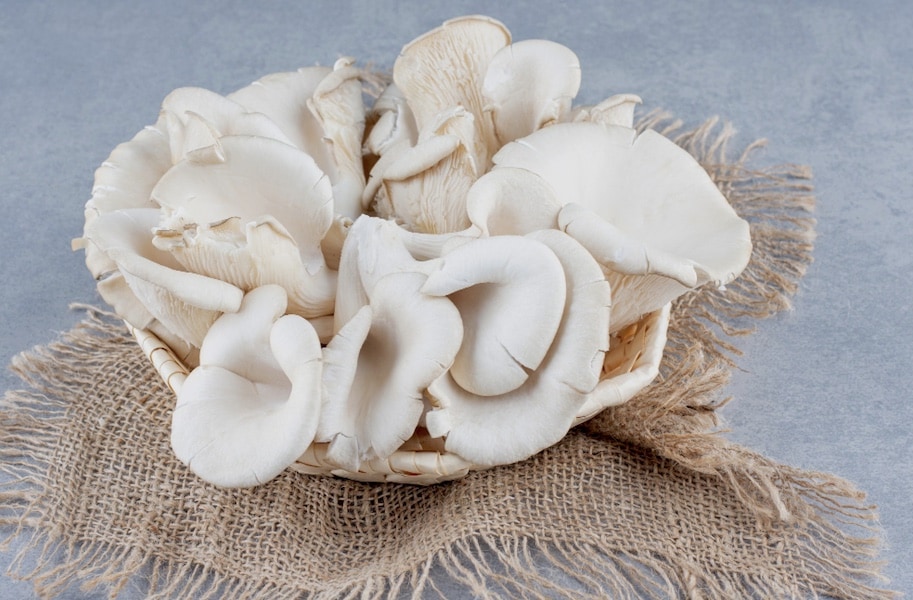
Fresh Oyster mushrooms (Pleurotus ostreatus)
11. King Oyster Mushroom
King Oyster Mushrooms (Pleurotus eryngii) is an edible mushroom commonly found in Asia, Europe, and North America. They have gained popularity in recent years for their unique taste and potential health benefits.
In conclusion, king oyster mushroom supplements may have potential health benefits, including supporting immune function, improving cholesterol levels, managing diabetes, and supporting heart health. However, there are also potential drawbacks to consider, including the risk of allergic reactions, interactions with medications, and the possibility of contamination. As with any supplement, it is important to speak with a healthcare provider before use to determine whether it is safe and appropriate for you.
Benefits
High in Nutrients. King oyster mushrooms are rich in nutrients such as potassium, phosphorus, copper, and zinc, as well as vitamins B1, B2, and B3. They are also a good source of dietary fiber and contain antioxidants that can help protect against free radical damage.
May Support Immune Function. King oyster mushrooms contain beta-glucans, a type of soluble fiber that has been shown to support immune function by activating immune cells such as macrophages and natural killer cells.
May Improve Cholesterol Levels. Some studies have found that king oyster mushrooms may help lower cholesterol levels in the blood. This may be due to their high fiber content or the presence of compounds such as ergothioneine and eritadenine.
May Help Manage Diabetes. King oyster mushrooms have been shown to have hypoglycemic effects, which means they may help lower blood sugar levels. This may be due to their high fiber content or the presence of compounds such as beta-glucans and polysaccharides.
May Have Anti-Cancer Properties. Some studies have found that king oyster mushrooms contain compounds that may have anti-cancer properties, including ergothioneine and eritadenine. However, more research is needed in this area.
May Support Heart Health. King oyster mushrooms contain compounds such as ergothioneine and eritadenine, which have been shown to have potential cardioprotective effects. They may help reduce inflammation and oxidative stress, which can contribute to the development of heart disease.
Side-effects
While rare, some people may experience allergic reactions to king oyster mushrooms. Symptoms may include itching, swelling, and difficulty breathing. If you experience any of these symptoms, stop using the supplement immediately and seek medical attention.
King oyster mushrooms may interact with certain medications, such as blood thinners and anti-platelet drugs. If you are taking any medications, be sure to talk to your healthcare provider before using king oyster mushroom supplements.
King oyster mushroom supplements may not be suitable for everyone, particularly pregnant or breastfeeding women, children, and people with certain medical conditions. If you are unsure whether this supplement is right for you, talk to your healthcare provider.
As with any supplement, there is a risk of contamination. Make sure to purchase king oyster mushroom supplements from a reputable source to minimize this risk.
While there is some research to suggest that king oyster mushrooms may have health benefits, more research is needed to confirm these effects and determine optimal dosages.
11. Enokitake Mushroom
Enokitake (Flammulina velutipes), also known as golden needle mushroom, is a popular edible mushroom that has been used in traditional medicine and cuisine for centuries. It is native to East Asia, particularly Japan, Korea, and China, but has now spread to other parts of the world due to its popularity. Enokitake is known for its unique taste and texture, as well as its numerous health benefits. In this article, we will examine the benefits and drawbacks of enokitake mushrooms.
Enokitake mushrooms are a delicious and nutritious addition to any diet, with numerous health benefits such as boosting the immune system, preventing cancer, and aiding digestion. However, it is important to be aware of the potential drawbacks, such as allergic reactions, toxicity, adverse drug interactions, and suitability for certain individuals. As with any new food, it is important to consume enokitake mushrooms in moderation and to seek medical advice if unsure.
Benefits
High Nutritional Value. Enokitake mushrooms are low in calories and fat but high in protein, fiber, and a variety of vitamins and minerals. They are particularly rich in B vitamins, potassium, and phosphorus, which are essential for good health.
Boost Immune System. Enokitake mushrooms contain beta-glucans, a type of complex carbohydrate that has been shown to enhance the immune system by activating white blood cells. These compounds can also help to reduce inflammation and fight against viruses and other harmful microorganisms.
Cancer Prevention. Enokitake mushrooms contain a substance called ergothioneine, which has been found to have antioxidant and anti-cancer properties. Research has shown that ergothioneine may help to prevent or slow the growth of certain types of cancer cells, including breast, liver, and colon cancer.
Lower Cholesterol and Blood Pressure. Enokitake mushrooms contain compounds that may help to lower cholesterol levels and reduce blood pressure. This can reduce the risk of heart disease and stroke, which are major causes of death worldwide.
Aid Digestion. Enokitake mushrooms contain enzymes that can help to break down food and aid digestion. They are also a good source of dietary fiber, which can help to regulate bowel movements and promote a healthy gut.
Anti-inflammatory Properties. Enokitake mushrooms contain compounds that can help to reduce inflammation in the body, which can be beneficial for those with inflammatory conditions such as arthritis, asthma, and inflammatory bowel disease.
Weight Loss. Enokitake mushrooms are low in calories and high in fiber, which can help to promote weight loss by reducing hunger and increasing feelings of fullness. They are also a good source of protein, which can help to maintain muscle mass while losing weight.
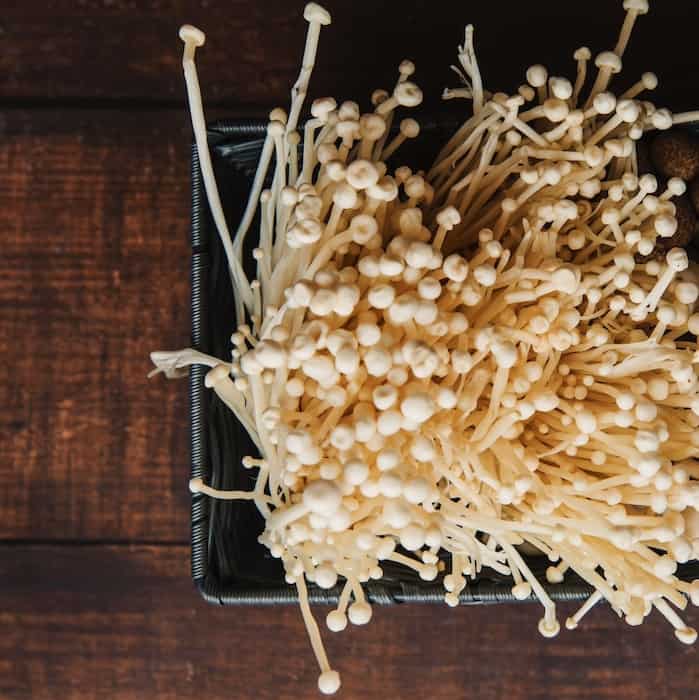
Enokitake mushrooms
Side-effects
Some people may be allergic to enokitake mushrooms, which can cause symptoms such as itching, hives, and difficulty breathing. It is important to be aware of any allergic reactions and to seek medical attention if necessary.
Enokitake mushrooms can contain small amounts of toxins that can cause illness if consumed in large quantities. It is important to only consume enokitake mushrooms that are sourced from reputable suppliers and to cook them thoroughly before consuming.
Enokitake mushrooms may interact with certain medications, such as blood thinners and anticoagulants. It is important to consult with a healthcare provider before consuming enokitake mushrooms if taking any medications.
Enokitake mushrooms may not be suitable for everyone, particularly those with certain medical conditions such as kidney disease or gout. It is important to consult with a healthcare provider before consuming enokitake mushrooms if unsure.


